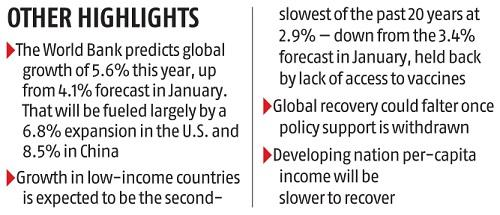Economy
Global Economic Prospects: World Bank
- 10 Jun 2021
- 6 min read
Why in News
Recently, the World Bank has released its June 2021 Global Economic Prospects where it has forecast India’s GDP growth to be 8.3% for the year 2021-22.
Key Points
- GDP Estimate:
- For India:
- India's economy is expected to grow at 8.3% for Fiscal Year 2021-22, 7.5% for 2022-23 and 6.5% for 2023-24.
- For World:
- The world economy is expected to expand 5.6%, the fastest post-recession growth rate in eighty years.
- However, global output will still be 2% below pre-pandemic projections by year-end.
- For India:
- Cause:
- For FY 2020-21:
- The projected growth compares to the worst ever contraction of 7.3% in FY 2020-21 and 4% expansion in 2019-20.
- India’s recovery is being hampered by the largest outbreak of any country since the beginning of the pandemic.
- For FY 2021-22:
- The forecast for FY22 (8.3%) factors in expected economic damage from an enormous second Covid-19 wave and localised mobility restrictions since March 2021.
- For FY 2022-23:
- Growth is expected to slow to 7.5% as a result of the pandemic’s lingering effects on the financial position of households, companies and banks and possibly low levels of consumer confidence and heightened uncertainty around job and incomes.
- For FY 2020-21:
- Steps Taken by India:
- The Reserve Bank of India (RBI) announced measures to provide liquidity to Micro, Small and Medium firms (MSMEs), and loosened regulatory requirements on the provisioning for non-performing assets.
- Fiscal policy shifted in the FY 2021/22 budget toward higher expenditure targeted at healthcare and infrastructure to boost the post-pandemic recovery.
- Suggestions:
- Globally coordinated efforts are essential to accelerate vaccine distribution and debt relief, particularly for low-income countries.
- As the health crisis eases, policymakers will need to address the pandemic’s lasting effects and take steps to spur green, resilient, and inclusive growth while safeguarding macroeconomic stability.
- For low-income countries, policies focusing on scaling up social safety net programs, improving logistics and climate resilience of local food supply would be more helpful.
Key Terms
- Gross Domestic Product
- GDP is a measure of economic activity in a country. It is the total value of a country’s annual output of goods and services. It gives the economic output from the consumers’ side.
- GDP = Private consumption + Gross investment + Government investment + Government spending + (exports-imports).
- Recession and Depression
- Recession: It is a macroeconomic term that refers to a slowdown or a massive contraction in economic activities for a long enough period, or it can be said that when a recession sustains for long enough, it is called a recession.
- Depression: It is a deep and long-lasting period of negative economic growth, with output falling for at least 12 months and GDP falling by over 10% or it can be referred to as a severe and prolonged recession.
- Fiscal Policy
- Fiscal policy refers to the use of government spending and tax policies to influence economic conditions.
- During a recession, the government may employ expansionary fiscal policy by lowering tax rates to increase aggregate demand and fuel economic growth.
- In the face of mounting inflation and other expansionary symptoms, a government may pursue contractionary fiscal policy.
World Bank
- About:
- The Bretton Woods Conference held in 1944, created the International Bank for Reconstruction and Development (IBRD) along with the International Monetary Fund (IMF).
- The IBRD later became the World Bank.
- The World Bank Group is a unique global partnership of five institutions working for sustainable solutions that reduce poverty and build shared prosperity in developing countries.
- The Bretton Woods Conference held in 1944, created the International Bank for Reconstruction and Development (IBRD) along with the International Monetary Fund (IMF).
- Members:
- It has 189 member countries. India is also a member country.
- Major Reports:
- Ease of Doing Business.
- Human Capital Index.
- World Development Report.
- Migration and Development Brief.
- Global Economic Prospects.
- Its Five Development Institutions:
- International Bank for Reconstruction and Development (IBRD): Provides loans, credits, and grants.
- International Development Association (IDA): Provides low- or no-interest loans to low-income countries.
- International Finance Corporation (IFC): Provides investment, advice, and asset management to companies and governments.
- Multilateral Guarantee Agency (MIGA): Insures lenders and investors against political risk such as war.
- International Centre for the Settlement of Investment Disputes (ICSID): Settles investment-disputes between investors and countries.
- India is not a member of ICSID.





